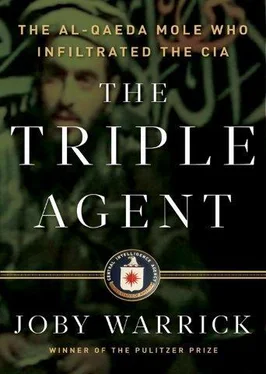There was yet another surprise. One of the most enduring mysteries since the founding of the modern jihadist movement was who had killed Abdullah Azzam, the revered Palestinian cleric who helped lead the anti-Soviet insurgency in Afghanistan in the 1980s. Azzam had been a mentor and teacher to Osama bin Laden, but in his later years he had clashed with bin Laden’s followers over the terrorist group’s willingness to spill Muslim blood to advance their cause. His death in 1989 by a remote-control bomb in Peshawar, Pakistan, was the Muslim world’s equivalent of the John F. Kennedy assassination, drawing legions of conspiracy theorists, who variously linked the slaying to the Soviets, Israelis, Americans, Pakistanis, Afghans, and even bin Laden himself. Now bin Zeid said flatly that Azzam’s death too had been the work of the Mukhabarat. He even offered the name of the assassin: bin Zeid’s own boss, Ali Burjak, the “Red Devil.”
“If you go and kill any leader of the mujahideen, you’ll become the top man in Jordan, like my chief,” bin Zeid had said.
It was now clear what bin Zeid was looking for, and Balawi, after some thinking, decided to float his idea. I could go to FATA , he offered.
The proposal sparked furious discussions at the Mukhabarat and at the Amman counterterrorism center run jointly with the CIA. Balawi was no agent, that was clear; he had no training, spoke no Pashto, and could hardly be considered reliable after a few nights in detention and a handful of dinners and coffees with bin Zeid. On the other hand, there was little to lose.
A quick consensus was reached on the key points. For the cost of only a few thousand dollars, Balawi could be set loose in Pakistan with a serviceable cover story. Fortunately for him, he already possessed assets that would accord him instant credibility in Taliban country, including a medical degree and an Internet persona. He would essentially work on spec, earning significant rewards only in the unlikely event that he could deliver someone important. He would not be given fancy communication gadgets or anything that might expose him as a spy if he were discovered. If he were killed—the chances were judged to be high—few outside Balawi’s own family would notice or care.
Questions were raised about why Balawi would even consider leaving his home and job for such a dangerous assignment. To judge from his behavior in his meetings with bin Zeid, the answer seemed obvious: money. In reports summarizing Balawi’s views about his possible assignment, the physician appeared to vacillate between deep concern over his safety and endless curiosity about the size of his reward.
With the CIA now fully on board, the logistics of Balawi’s journey came together with remarkable speed. Balawi would need an expedited Pakistani visa, so a letter inviting the Jordanian physician to a diabetes conference in Pakistan was drafted. E-mail accounts were created and tested. Code words were forged and memorized.
Balawi would also have a new code-name. No longer Panzer—the handle bin Zeid had chosen—he would now be known by his CIA name, Wolf.
A critical decision that fell to the CIA was whether to inform Pakistan, a U.S. ally, of the plan to insert an undercover operative into its sovereign territory. Langley quickly rejected the idea. Top CIA officials were convinced that Pakistan’s Inter-Services Intelligence agency harbored agents sympathetic to Jalaluddin Haqqani, a Pashtun warlord who had been backed by Islamabad during the 1980s and was now a supporter of the Afghan insurgency. Balawi could be betrayed and killed before he had time to unpack his bags.
The final step was airline tickets. An open-ended return flight was purchased and hand-delivered by bin Zeid, along with a fat envelope stuffed with dollars.
Months later some U.S. intelligence officials still marveled over how quickly the plan came together and also over the eagerness with which agency veterans bought into the notion that the untrained Balawi could survive in a lawless FATA, let alone penetrate a dangerous terrorist network. Such a thing had never happened, not like this. By luck of timing, Balawi had turned up on the Mukhabarat’s doorstep with his unique set of assets—a physician with impeccable jihadist credentials, seemingly willing to put his life on the line—at the precise moment the CIA and a new U.S. administration were scrambling to find new methods and agents for a ramped-up global hunt for Osama bin Laden.
“Balawi dangled that he could go,” said one recently retired agency official privy to internal conversations about the Jordanian. “And he happened to match with a beautiful priority.”
Sleep eluded Humam Khalil al-Balawi. The day had been insanely hot, and the temperature was still in the nineties well after sundown. Worse, as he lay still in the dark, the humming of drones grew even louder, like a mosquito he could never swat away.
Balawi’s home through midsummer was in one of the Mehsud clan’s walled compounds in Makeen, a small town of loosely clustered mud-brick houses and shops surrounded by scrubby hills. At bedtime he had taken his mat into the outer courtyard and unrolled it near one of the guard posts to try to sleep. In the dim light he could make out a familiar form, a paralyzed man whom the fighters called Ahmad. The Pashtun man had lost his legs to disease, but Ahmad insisted on taking his turn at guard duty and refused to be relieved when his shift ended. He sat in his wheelchair with his rifle in his lap until sunrise. Humam could hear the man praying softly and occasionally sobbing. It was an impressive display of devotion that was, in true Taliban fashion, carried to a pointless extreme.
The same was true for Baitullah Mehsud himself. There were little things, like his behavior during group dinners. Baitullah would make a dramatic display of personally dishing out the choicest cuts of meat to his dinner guests until there was nothing left for himself but bones and fat. The performance made Balawi so uncomfortable that he made excuses to avoid eating with his host.
Baitullah Mehsud also appeared to have bought into the myth of his own invincibility. Two years after becoming chief of the Pakistan Taliban, he had grown fond of media attention, and he enjoyed staging news conferences, allowing the cameras full view of the head that was said to be worth more than five million dollars in bounty payments. Between staged events he would engage in long interviews over an open phone line, talking and laughing with journalists, seemingly oblivious of the possibility that his phone signal might be a beacon guiding a CIA missile to his compound. His swagger extended to absurd boasts about how his small band of illiterate, ill-equipped mountain fighters were poised to defeat not only Islamabad but also the great powers of the West.
“We pray to God to give us the ability to destroy the White House, New York and London,” he told a television interviewer. “And we have trust in God. Very soon, we will be witnessing jihad’s miracles.”
Baitullah’s insistence on his own supremacy in all things—military strategy as well as more mundane matters such as the divvying up of profits from contraband smuggling—sometimes sparked violent clashes with other Mehsuds. The diminutive commander also seemed to delight in agitating the Haqqanis and other militant groups by picking gratuitous fights with the Pakistani army and intelligence service, practically daring Islamabad to come after him, as eventually it did. Once, after surrounding and capturing an entire garrison of 250 Pakistani soldiers and paramilitary troops, Baitullah proceeded to cut off the heads of three of his prisoners as the opening gambit in a negotiated prisoner swap.
It was a far cry from the idealized holy war that Balawi had championed in his blog. Baitullah Mehsud was neither a revolutionary nor a prophet. He was a thug with a massively inflated ego, a murderer who enjoyed killing other Muslims. He presided over a town that was dirty, backward, and mean, where girls barely older than Balawi’s daughter Leila were condemned to lives of little or no formal education and no appreciable rights, in a region where a newborn is three times more likely to die in his first year of life than a child born in Balawi’s native Jordan.
Читать дальше












